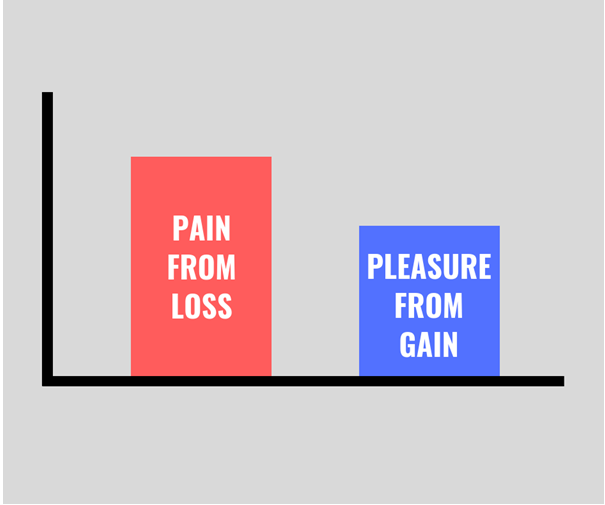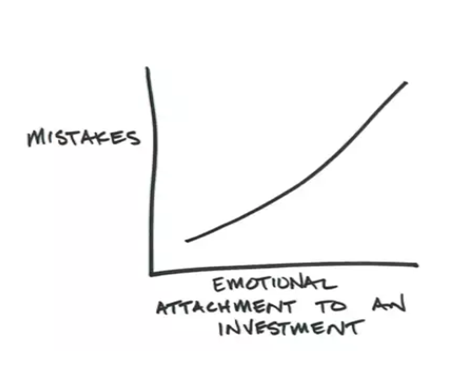Loss aversion is a trait of investor behaviour wherein investors prefer to avoid a loss than to make an equivalent profit. Loss aversion is also known as Regret Aversion. When faced with a choice of avoiding a loss of Rs 1,000 or making a
profit of Rs 1,000, investors with loss aversion bias will prefer not making a loss to making a profit. Investors with loss aversion make often sub-optimal investment decision.
Loss Aversion versus Risk Aversion
It is easy to confuse between risk aversion and loss aversion because on the surface they appear to be the same. However, there is a difference between the two. Risk aversion is avoiding risks or the possibility of a loss; it gets reflected
in their choice of investments. Risk-averse investors will prefer less risky investments e.g. fixed income over equity, large cap over midcap etc. Investors with loss aversion bias may not be necessarily risk averse; they often invest
in risky assets. Loss aversion comes into play when investors are faced with uncertainties. The regret of a loss is far more than the satisfaction from an equivalent. According to behavioural economists, the psychological impact of a loss
is twice that of same amount of profit.
Harmful effects of loss aversion
- Loss aversion causes investors to hold on to loss making stocks or funds for very long period. They refuse to sell a stock or fund at a loss and can hold on it for long periods of time even if there are better alternative investment options
available.
- Aversion for losses makes investors hold on to loss making stocks or funds till the loss is recovered. Ultimately, when the investor sells the stock or fund, a long time may have elapsed and the return on the investment is very low.
- There are also instances of investors holding on to loss making stocks / funds and then finally selling them at a much bigger loss than what they would have incurred if they sold earlier.
- Loss aversion is commonly seen in property / real estate investments. Investors refuse to sell their property at a loss and hold on it to it hoping the investment will turn profitable someday. Throughout the holding period of the investment,
they pay interest on their loans which could have been avoided if they sold earlier.
How to avoid loss aversion and conclusion
No one likes to make a loss, but loss aversion can cause you to lose more money or make less money than what you feared to lose. You can avoid loss aversion by not getting too emotionally involved in your investments. There are risks involved
in investments, many of these risks are beyond your control and you cannot be right all the time. Sometimes, it is better to book a loss and move on to alternative investment options. It is difficult to separate emotions from investing,
but successful investors are able to do it. A good financial advisor can help you overcome this behavioural bias. You should have a rational and objective portfolio performance evaluation process; take the help of a financial advisor if
required. You should do what is right to meet your financial goals including selling funds that are underperforming consistently and switching to better funds.
Disclaimer:
An Investor Education and Awareness Initiative by Mirae Asset Mutual Fund. All Mutual Fund investors have to go through a one-time KYC (Know Your Customer) including the process for change in address, Phone number, bank details, etc. Investors
should deal only with registered Mutual Funds details of which can be verified on SEBI website (https://www.sebi.gov.in) under ‘Intermediaries /Market Infrastructure Institutions’.
For further information on KYC, RMFs and procedure to lodge a complaint in case of any grievance, you may refer the Knowledge Centre section available on the website of Mirae Asset Mutual Fund. Investors may lodge complaints on https://www.scores.gov.in against registered intermediaries if they are unsatisfied with the responses. SCORES facilitate you to lodge your complaint online with SEBI and subsequently view its status.
Mutual Fund investments are subject to market risks, read all scheme related documents carefully.
 ETF Website
ETF Website
 Invest Now
Invest Now
 Online e-KYC
Online e-KYC

![mirae asset usa]() Australia
Australia
![mirae asset brazil]() Brazil
Brazil
![mirae asset colombia]() Colombia
Colombia
![mirae asset hong kong]() Hong Kong SAR
Hong Kong SAR
![mirae asset Japan]() Japan
Japan
![mirae asset uk]() United Kingdom
United Kingdom
![mirae asset usa]() United States
United States
![mirae asset singapore]() Singapore
Singapore
![mirae asset uk]() Ireland
Ireland
![mirae asset canada]() Canada
Canada
![mirae asset india]() Global
Global
![mirae asset australia]() Australia
Australia
![mirae asset hong kong]() Hong Kong SAR
Hong Kong SAR
![mirae asset india]() India
India
![mirae asset korea]() Korea
Korea
![mirae asset korea]() UAE
UAE
![mirae asset uk]() United Kingdom
United Kingdom
![mirae asset usa]() United States
United States
![mirae asset vietnam]() Vietnam
Vietnam
![mirae asset korea]() Korea
Korea
 Global
Global
 Australia
Australia
 Hong Kong SAR
Hong Kong SAR
 India
India
 Korea
Korea
 UAE
UAE
 United Kingdom
United Kingdom
 United States
United States
 Vietnam
Vietnam
 Korea
Korea
 Australia
Australia
 Brazil
Brazil
 Colombia
Colombia
 Hong Kong SAR
Hong Kong SAR
 Japan
Japan
 United Kingdom
United Kingdom
 United States
United States
 Singapore
Singapore
 Ireland
Ireland
 Canada
Canada






